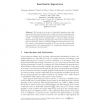135
click to vote
ESORICS
2005
Springer
15 years 7 months ago
2005
Springer
Abstract. Formal methods have been extensively applied to the certification of cryptographic protocols. However, most of these works make the perfect cryptography assumption, i.e....
113
click to vote
ESORICS
2005
Springer
15 years 7 months ago
2005
Springer
Abstract. Hippocratic Databases have been proposed as a mechanism to guarantee the respect of privacy principles in data management. We argue that three major principles are missin...
103
click to vote
ESORICS
2005
Springer
15 years 7 months ago
2005
Springer
We consider the enforcement powers of program monitors, which intercept security-sensitive actions of a target application at run time and take remedial steps whenever the target a...
137
click to vote
ESORICS
2005
Springer
15 years 7 months ago
2005
Springer
The freedom and transparency of information flow on the Internet has heightened concerns of privacy. Given a set of data items, clustering algorithms group similar items together...
133
click to vote
ESORICS
2005
Springer
15 years 7 months ago
2005
Springer
Access control is concerned with granting access to sensitive data based on conditions that relate to the past or present, so-called provisions. Expressing requirements from the do...
109
click to vote
ESORICS
2005
Springer
15 years 7 months ago
2005
Springer
Currently, many industrial initiatives focus on web-based applications. In this context an important requirement is that the user should only rely on a standard web browser. Hence...
115
click to vote
ESORICS
2005
Springer
15 years 7 months ago
2005
Springer
The abstraction of cryptographic operations by term algebras, called Dolev-Yao models, is essential in almost all tool-supported methods for proving security protocols. Recently si...
ESORICS
2005
Springer
15 years 7 months ago
2005
Springer
We define security goals and attack models for disk encryption, and prove several relationships between the resulting security notions, and some general results about disk encryp...
103
click to vote
ESORICS
2005
Springer
15 years 7 months ago
2005
Springer
Information flow and non-interference are well-established techniques for expressing both integrity and privacy properties. Because of the enormous potential to transmit informati...
121
click to vote
ESORICS
2005
Springer
15 years 7 months ago
2005
Springer
We introduce the notion of sanitizable signatures that offer many attractive security features for certain current and emerging applications. A sanitizable signature allows author...

